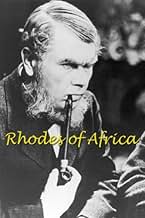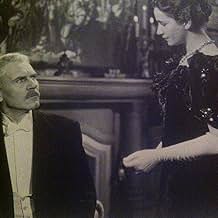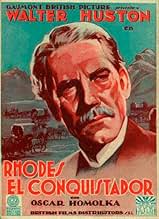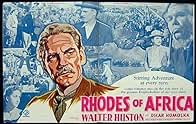This rousing adventure film tells the true story of Cecil Rhodes, a diamond miner who helped found the South African colonies.This rousing adventure film tells the true story of Cecil Rhodes, a diamond miner who helped found the South African colonies.This rousing adventure film tells the true story of Cecil Rhodes, a diamond miner who helped found the South African colonies.
- Awards
- 2 wins total
Ndanisa Kumalo
- King Lobengula
- (as Ndanisa Kumalo of Matabeleland)
Felix Aylmer
- Johannesburg Diplomat
- (uncredited)
Diana de Vaux
- Sara
- (uncredited)
Victor Fairley
- Official Announcing 'Diamond Rush'
- (uncredited)
Ernest Jay
- Minor Role
- (uncredited)
Allan Jeayes
- Kruger's Minister
- (uncredited)
Sam Livesey
- Johannesburg Diplomat
- (uncredited)
Glennis Lorimer
- Cartwright's Fiancee
- (uncredited)
Featured reviews
From Gaumont Pictures,UK, Rhodes of Africa stars Walter Huston, Oskar Homolka, and a whole lot of British actors that Americans probably don't know. Huston had won his Oscar for "Treasure of the Sierra Madre" with Bogart. Homolka had worked in England and Hollywood on some biggies, like "Sabotage", "Seven Year Itch", and "War and Peace". Right from the beginning, we know the film is about the life of Cecil Rhodes, who explored and conquered South Africa. It opens with (uncredited) narrator describing what south Africa was like, prior to and during Rhodes actions, and the discovery of diamonds there. It runs like a documentary, but as others have noted, probably much white-washed from what actually occurred. Very serious mood at all times, they highlight the obstacles faced by Rhodes and his plans.
A card at the opening acknowledges the cooperation of the people of Rhodesia "for making possible the realisation of the African scenes", but it is not made clear what exactly that cooperation entailed... Directed by Berthold Viertel in 1936, this was the last film he made, although he lived almost another twenty years. IMDb shows he only directed 15 films.
A card at the opening acknowledges the cooperation of the people of Rhodesia "for making possible the realisation of the African scenes", but it is not made clear what exactly that cooperation entailed... Directed by Berthold Viertel in 1936, this was the last film he made, although he lived almost another twenty years. IMDb shows he only directed 15 films.
90 minutes is hardly long enough time to tell the story of a most complex man. Cecil Rhodes was a combination robber baron and adventurer who amassed a fortune by being the last man standing in a war to control the diamond mining industry in South Africa. But Rhodes was a guy who dreamed big and wanted nothing less than control of sub Sahara Africa and if he had lived another two decades he might have had it.
Walter Huston was imported from America to play Rhodes who never married. So single minded and intense was he in pursuit of his goals he didn't make time or wasn't interested in a family. If he had done that the immense fortune that he acquired would never have gone to Rhodes scholarships for instance.
Obviously Gaumont British films wanted him to be a hero, but there just was too much bad in what he did to create his fortune to make Huston as Rhodes a sympathetic figure. His great adversary Paul Kruger leader of the Transvaal Republic of the Boers played here by Oscar Homolka comes off as more sympathetic. By accident Gaumont British did what UFA Studios in Nazi Germany did on purpose in their film Ohm Kruger where the same story is told from the Boer and hence anti-British point of view.
With an independent and majority black led South Africa now, the Cecil Rhodes if filmed today would be markedly different. Probably a whole lot better as well.
Walter Huston was imported from America to play Rhodes who never married. So single minded and intense was he in pursuit of his goals he didn't make time or wasn't interested in a family. If he had done that the immense fortune that he acquired would never have gone to Rhodes scholarships for instance.
Obviously Gaumont British films wanted him to be a hero, but there just was too much bad in what he did to create his fortune to make Huston as Rhodes a sympathetic figure. His great adversary Paul Kruger leader of the Transvaal Republic of the Boers played here by Oscar Homolka comes off as more sympathetic. By accident Gaumont British did what UFA Studios in Nazi Germany did on purpose in their film Ohm Kruger where the same story is told from the Boer and hence anti-British point of view.
With an independent and majority black led South Africa now, the Cecil Rhodes if filmed today would be markedly different. Probably a whole lot better as well.
Cecil Rhodes is NOT an easy guy to like here in the 21st century. While back in his day he was hailed as a hero, he was also the guy who started De Beers (the diamond monopoly) and was the poster boy for colonialism--having been the leader of Cape Colony (South Africa) and having started Rhodesia (now Zimbabwe)--two of the more racist nations at the time. He also had a huge part in orchestrating the bloody Boer War at the turn of the 19th century. So, it's not surprising that we don't see more biographies of the man--pro-colonialism films died out a long time ago.
This 1936 film is not especially good. First, it is dry as dust and often looks more like a documentary instead of a feature film--a very DRY documentary. Second, how good could such a biography be when they cast the VERY American Walter Huston in the lead?! Sure, he was a very fine actor...and totally wrong as the British Rhodes. Third, while the film SHOULD have been beautiful an expansive, it's obvious that the film was made in a studio--not the lovely South African countryside. And, the film lacks music that might have made the whole thing look and SOUND grand. Instead, it was just flat and dull.
By the way, Rhodes was, perhaps, the strongest supporter of colonialism in history and hoped to one day have Britain take control of Africa, the Middle East and even return the United States to its colonial empire! Now I would have loved to have heard this in the film!
This 1936 film is not especially good. First, it is dry as dust and often looks more like a documentary instead of a feature film--a very DRY documentary. Second, how good could such a biography be when they cast the VERY American Walter Huston in the lead?! Sure, he was a very fine actor...and totally wrong as the British Rhodes. Third, while the film SHOULD have been beautiful an expansive, it's obvious that the film was made in a studio--not the lovely South African countryside. And, the film lacks music that might have made the whole thing look and SOUND grand. Instead, it was just flat and dull.
By the way, Rhodes was, perhaps, the strongest supporter of colonialism in history and hoped to one day have Britain take control of Africa, the Middle East and even return the United States to its colonial empire! Now I would have loved to have heard this in the film!
Anyone interested in the British film industry of the 1930s in general and this film specifically should read "The Unknown 1930s" edited by Jeffrey Richards and published by I.B.Tauris in 1998.In particular read Chapter 10 commencing on P201 entitled "Berthold Viertel At Gaumont British".Pages 212-215 give detail about the making of this film.It is rather funny in view of the parts that he played that just before filming was about to begin it was realised that Arliss did not resemble Rhodes.The part went to Walter Huston a friend of Mark Ostrer who was one of the major shareholders in Gaumont British.Oscar Homolka was cast because he had worked with Viertel before and shared the same agent.It is ironic that i am the first person from the UK to review this film,since it is unseen and forgotten here.The other reviewers seem to think that this is a Boys Own Adventure in the same vein as "The Drum" or "Gunga Din" which it is not.It is a biography.In fact the only set action piece is truncated half way through.It is an attempt to tell the story of the statesman Rhodes and at the same time extol the virtues of the Empire.it fails on both counts.It suffers the usual problems of such films of having too little time to tell too big a story.One dissolve covers a period of 10years.Rhodes was an aggressive colonist and treated the natives as children as is admitted by the film.Looking at the film in the 1930s these were perfectly acceptable sentiments.Today we can but wonder whether the ills of the continent were to an extent the responsibility of Rhodes.This film was part of a programme designed to woo American audiences.However in June 1937 the company announced that they had lost £98000 the previous year,a colossal amount,production was topped immediately and Lime Grove studios were shut down.This left Gainsborough to turn out Will Hay and Crazy Gang comedies.Balcon went to Ealing Studios via MGM Borehamwood and the rest is history.
Cecil Rhodes was a terrible person who exploited Africa. Anyone with enough time should read up on his life. He double-crossed friends and foe alike. Many of these old films were like so much propaganda films for the white man mentality of stealing and swindling to get rich while making the person look like some kind of hero. I guess you could make a film about Hitler or Saddam Hussein in a favourable light also.Cecil Rhodes thought Africa should belong to White men. He believed it was the white man's destiny to rule the world.Actually most movies of this age and most now don't reflect reality. Just what the people want to believe. Watch any movie you see with a grain of salt.
Did you know
- TriviaFinal film directed by Berthold Viertel.
- ConnectionsReferenced in Humour and Horror: Jonathan Rigby on Oscar Homolka (2024)
- SoundtracksCome Down and Open the Door
(uncredited)
Written by Slade Murray and A. Sutherd
Details
- Runtime
- 1h 30m(90 min)
- Color
- Sound mix
- Aspect ratio
- 1.37 : 1
Contribute to this page
Suggest an edit or add missing content

























